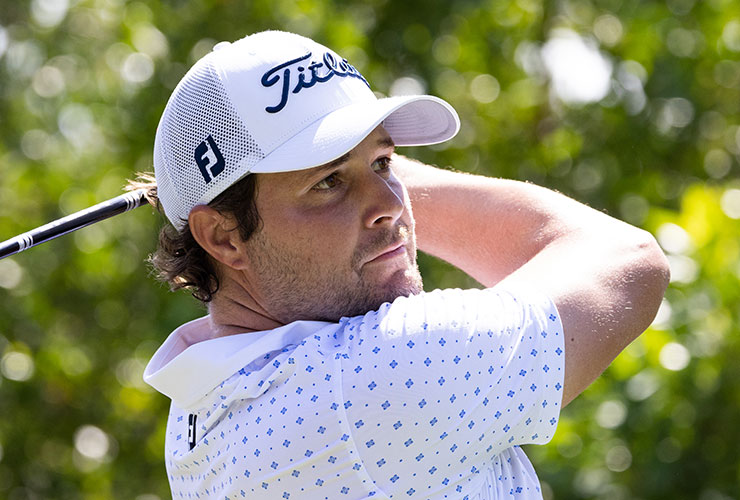Peter Uihlein. LIV Golf
Peter Uihlein not only ranks as one of LIV Golf’s top performers, he’s also the son of Wally Uihlein, the retired president and CEO of the Acushnet Company that counts Titleist — makers of the ultra-popular Pro VI golf ball — as one of its brands.
That provides the younger Uihlein with a unique platform to speak about this week’s announced proposal by the USGA and the R&A to rollback the golf ball in order to curtail hitting distances by elite competitors.
RELATED: ‘How the Guardians got it right with rollback’
Thomas against rollback — even if it helps him
“I look at it from a business standpoint,” the 4 Aces team member said on the eve of this week’s LIV Golf Tucson.
The proposal, he feared, may negatively impact the pocketbooks of top professional golfers due to the trickle-down effect of developing a new golf ball that won’t appeal to recreational players, thus forcing companies to contemplate budget cuts.
Let him explain.
“I think Callaway puts like $70 million into their R&D department. Titleist puts like $55 million,” said Uihlein, who has three runner-up finishes in his last four LIV Golf regular-season starts dating back to last year. “You’re then going to be asking these companies to make a product for players that they won’t sell to the public.
“If I’m running a company and I’ve now got to put in, say, $20 million to make these products for the pros, well, you’re going to have to find a place to potentially budget cut. If I was running a company, the first place I would look to for budget cuts are the players.
“All of a sudden, now instead of paying JT, Jon Rahm, whatever they’re paying them — slash that. And you’re slashing other things, you’re slashing other players, you’re slashing ball/shoe/glove guys, just to make up for that loss.
“I don’t think the USGA really understands that you’re affecting players’ pockets when you’re making these changes. Companies need to make money. Titleist isn’t out there to lose money. That’s not what their job is. If they need to spend X amount on making a product that they can’t sell to the public, then all of the sudden you’re going to have to make that up somewhere else. In my opinion, that’s the route I would go. I would go players.”
Uihlein noted that supporters of the proposal are citing Major League Baseball as an example of a sports league that uses different equipment at the amateur and college levels than in the pro game. But he said it’s not an apples-to-apples comparison.
“Major League Baseball provides teams with baseballs, they provide teams with bats, unless you’re a guy who outsources and pays for his own bats. MLB provides these teams with that, so they spend that money,” Uihlein said. “If you’re using baseball as an example, then OK, here’s the example. If the USGA and R&A want guys to use a different ball, then they should pay for it.”
If the golf ball rollback proposal is adopted, it would not go into effect until January 1, 2026. Uihlein believes the nearly three-year window gives the governing bodies plenty of time to save face if widespread criticism continues.
“I haven’t really seen any positive feedback on it,” Uihlein said. “They’ve given themselves a buffer. If the players fight back, if the PGA Tour fights back, LIV fights back, European Tour fights back, then it’s: ‘Oh, well.’
“The funniest thing to me is the USGA is acting like equipment companies have taken advantage of a system that they [governing bodies] have put in place. These were regulations that they established. It’s not the equipment companies’ fault for trying to innovate. That’s the way the world works. You try to innovate.
“These were problems that they put in place. They weren’t smart enough to basically put a cap on it 20-30 years ago. They didn’t have the wherewithal. But that’s not a secret to anybody. They’ve always been a little bit inept.”
Now that the proposal is public, Uihlein isn’t sure the USGA and R&A will be quick to walk away.
“From what I’ve heard with [R&A’s] Martin Slumbers and what I’ve heard with [USGA’s] Mike Whan, it feels like this is a legacy move for them,” Uihlein said. “This is how they want to leave their name in the game of golf by doing this. So be it.”
Having heard a near-universal negative reaction across multiple tours from the game’s professional players – including fellow LIV Golf League member Bryson DeChambeau, who called the proposal “atrocious” – Uihlein offered one more thought.
“It’s funny,” he said. “There’s nothing that brings the tours together like everyone’s hatred for the USGA. It’s been interesting.”









